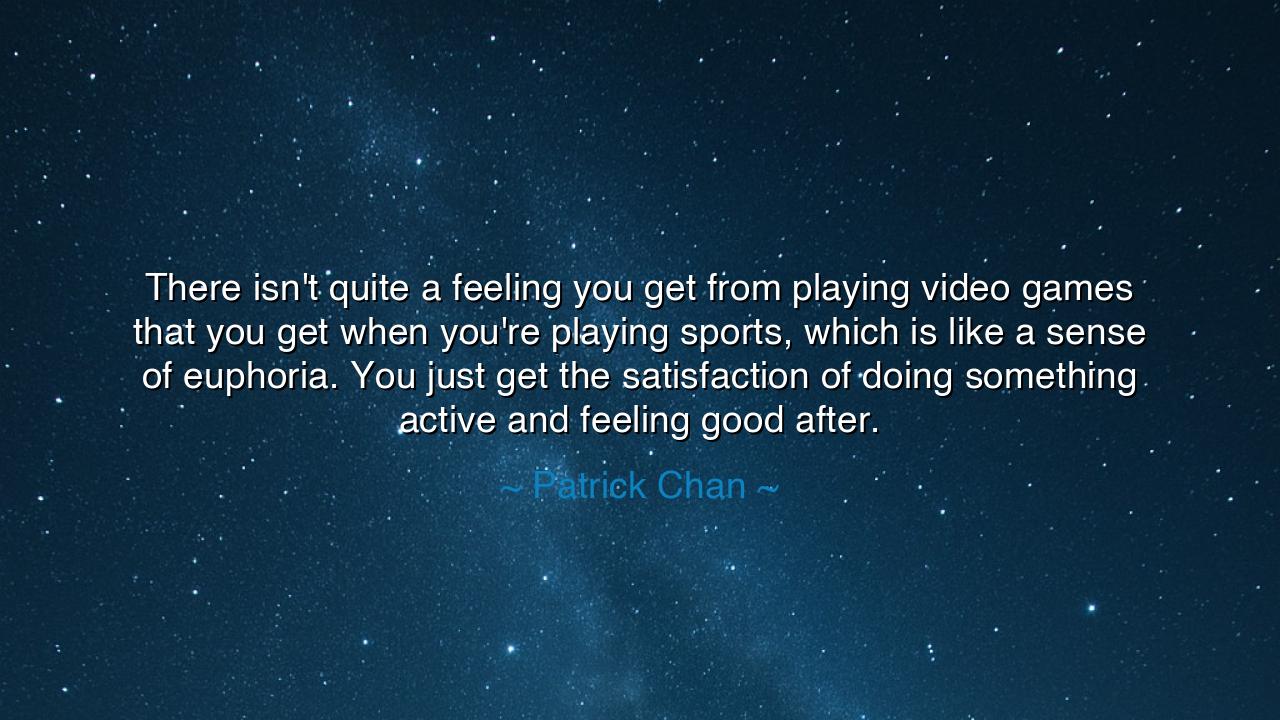
There isn't quite a feeling you get from playing video games
There isn't quite a feeling you get from playing video games that you get when you're playing sports, which is like a sense of euphoria. You just get the satisfaction of doing something active and feeling good after.






Patrick Chan, a master of the ice, once spoke these words: “There isn’t quite a feeling you get from playing video games that you get when you’re playing sports, which is like a sense of euphoria. You just get the satisfaction of doing something active and feeling good after.” Though simple in phrasing, this reflection carries the weight of ancient truth. It reveals the eternal difference between passive illusion and lived reality, between the shadow of experience and the burning fire of action.
At the heart of Chan’s words is the distinction between fleeting distraction and embodied triumph. Video games can simulate conquest, risk, and victory, but their victories dissolve the moment the screen is darkened. By contrast, sports summon not only the mind but the body, demanding struggle, sweat, and sacrifice. And when triumph is achieved, it does not vanish like pixels—it remains in the muscles, in the lungs, in the spirit itself. This is why true euphoria belongs to the arena, not the console.
The ancients knew this well. The Greeks gathered in Olympia not to watch shadows of contests, but to run, to throw, to wrestle under the open sky. Their victories brought honor not only to themselves but to their cities, and the memory of their deeds lived on in stone and story. Plato himself wrote that gymnastics trained the body as philosophy trained the soul, for both demanded discipline, both led to harmony. In this way, sport was not pastime but pathway—a road to greatness and joy.
History offers living examples. Consider the marathoner who crosses the line after hours of exhaustion—his body broken, yet his spirit soaring with the satisfaction of endurance. Or the soldier of ancient Sparta, who trained with spear and shield not merely for play but to keep his people free. Their triumphs were not imagined; they were written into muscle and bone, carved into the annals of memory. No game of shadows could replace the glory of deeds.
Chan’s reflection also speaks to the human hunger for activity. To move, to labor, to test the limits of flesh is to awaken the body’s ancient design. The blood quickens, the breath deepens, and the soul rises in tandem with the body’s exertion. This union of effort and spirit is what produces the euphoria he names—a joy not granted but earned. The idle cannot taste it, for it is born only of striving.
Yet there is no condemnation in his words, only a reminder. Games of the mind may amuse, but they cannot fulfill. If one wishes for true joy, one must rise, one must act, one must sweat. To sit before the illusion is to borrow happiness for a fleeting moment; to stand upon the field or the rink is to forge it with one’s own hands. That is why, when the body is tired and the heart is full, the soul feels most alive.
Therefore, let us take the lesson: seek not only diversion, but satisfaction. Let us not spend our lives in imitation, but in creation and action. Choose the path that makes the muscles ache and the spirit soar, for there lies the euphoria of life itself. As Patrick Chan teaches, joy is not found in watching shadows, but in stepping into the arena, where every victory, however small, becomes part of who we are.






AAdministratorAdministrator
Welcome, honored guests. Please leave a comment, we will respond soon